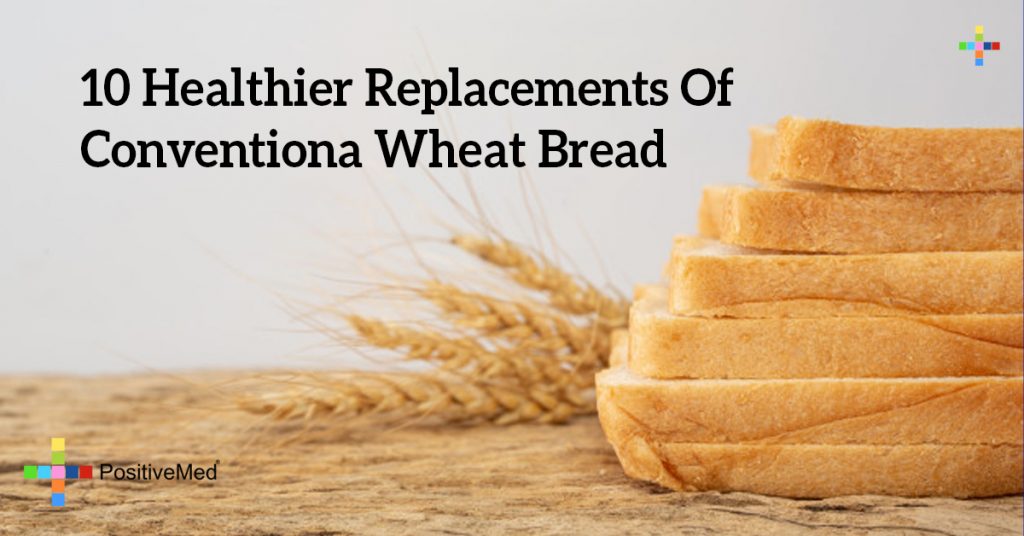
10 Healthier Replacements Of Conventional Wheat Bread
The majority of wheat bread in the market are made with refined wheat flour which has been stripped of most fiber and other essential nutrients.

Since the wheat is so processed it acts as sugar in the human body. When you eat wheat, your blood sugar levels spike followed by a drop, which not only robs you of energy but may also have negative health effects in the future, e.g. increased risk of getting type-2 diabetes.
You may think that eating whole wheat bread is a solution but it turns out that most commercial whole wheat bread are made using pulverized grains, so they have similar effect on blood sugar levels as a regular wheat bread.
Another problem with wheat bread is that it contains gluten, and many people suffer from either Celiac disease or gluten sensitivity. It also makes a lot of people bloated, may cause headaches or indigestion.
RELATED ARTICLE: Symptoms of Gluten Sensitivity You Probably Don’t Know About
One more problem with conventional wheat bread is that it often contains preservatives, flavor enhancers, and other chemicals that are not ideal for one’s health.
There are many reasons to avoid conventional wheat bread. The good news is that there are a lot of ways how to replace it with more healthy options!
1. Ezekiel bread
Ezekiel bread is a much healthier option than regular wheat bread since it’s made with several types of sprouted grains and legumes, including wheat, millet, barley, soybeans and lentils.
Before making this bread, the grains are sprouted, which reduces a number of anti-nutrients. Anti-nutrients are substances that inhibit the absorption of vitamins, minerals, and other beneficial compounds. Therefore, by sprouting the grains, the Ezekiel bread becomes more digestible and the nutrients in it more absorbable.
It’s important to note that this bread still contains gluten, therefore, it’s not suitable for people with Celiac disease or gluten sensitivity. You can buy this bread at some bakeries or health food stores, or you can make your own at home.
2. Rye sourdough bread
Rye bread is darker and denser than wheat bread and it contains more fiber, therefore it doesn’t spike blood sugar levels as rapidly.
Sourdough means that it’s made from fermented grains. The fermentation process also reduces the number of anti-nutrients and makes the bread more digestible and nutritious.
Rye bread also contains gluten, although less than wheat, therefore it’s not suitable for people with Celiac disease or gluten sensitivity.
You can find it in many health food stores, bakeries, and supermarkets, or you can make it your’ own at home.
3. Corn tortilla
Tortillas are usually made with either wheat or corn. Corn tortillas are a healthier option since they do not contain gluten.
Corn tortillas are also high in fiber, therefore they do not spike blood sugar levels as rapidly as wheat.
You can use tortillas for sandwiches, wraps, pizzas or tacos.
It’s important to note that some people are also allergic or sensitive to corn, so they need to avoid it. Also, since most corn is genetically modified, it’s best to buy tortillas made of organic corn. If you make your own, buy organic corn flour.
4. Lettuce, cabbage or other leafy greens
Leafy greens like lettuce, cabbage, collard leaves or chard are the healthiest replacement of wheat bread!
They contain plenty of vitamins, minerals, antioxidants, phytonutrients, chlorophyll and fiber. They’re also low in calories, making them an ideal replacement. Big leaves are a great substitution for wraps and tacos. You can fill these leaves with any toppings you like!
5. Sweet potatoes
Boiled or baked sweet potato slices are an excellent substitution for buns, especially for burgers. Sweet potato is rich in beta-carotene, vitamins A, C and fiber. It’s delicious and goes well with mushrooms and any other veggies.
6. Cauliflower bread or pizza crust
Cauliflower pizza crust or flat bread is becoming very popular as it’s relatively easy to make, contains way less carbohydrates and calories than usual wheat bread or pizza crust, plus cauliflower is packed with fiber, vitamins, minerals and other essential nutrients.
To make cauliflower crust, simply grind about a pound of raw cauliflower in a food processor and cook the crumbs in a non-stick skillet for about 5 minutes (constantly stirring). Then add ground flax seeds (about 3 tablespoons soaked in 9 tablespoons of water) and 2 cups of rice and/or coconut flour. Add salt and any spices you like, then mix everything with your hands. If the dough is too dry, add more water, if it’s too wet, add more flour. Bake on a baking sheet with baking paper for about 25 minutes in the pre-heated oven (350 F).
RELATED ARTICLE: How Gluten Affects Your Health and 5 Things You Didn’t Know About It
8. Flax crackers
Flax crackers are incredibly easy to make! All you need is just ground flax seeds mixed with water and an oven! You may also add salt, pepper and other spices. For a raw version, use dehydrator instead of an over.
9. Raw flatbread
Raw flatbread is usually made with grated vegetables or vegetable pulp (left after juicing), combined with whole and/or ground nuts or seeds, salt, spices and some water. Then it’s dehydrated either in the oven on low temperature or in the dehydrator.
10. Whole grains
Whole grains may not have the same function as bread, e.g. holding a wrap or a sandwich together, but they may provide healthy carbohydrates and make your dish more filling and satiating.
It’s best to use naturally gluten-free grains such as quinoa, buckwheat, amaranth or brown rice. They’re packed with fiber and are way healthier option than conventional wheat bread.
About the Author:
 Osha Key is a life lover, certified nutritionist, weight loss expert, the creator of the Lovetarian Detox (at www.lovetariandetox.com) and Lovetarian Diet. After losing 40 pounds, Osha is now on a mission to help women do the same.
Osha Key is a life lover, certified nutritionist, weight loss expert, the creator of the Lovetarian Detox (at www.lovetariandetox.com) and Lovetarian Diet. After losing 40 pounds, Osha is now on a mission to help women do the same.
In her FREE Weight Loss Video Training series at www.lovetariandetox.com, Osha teaches everything that has helped her lose 40 pounds of fat and keep it off.





